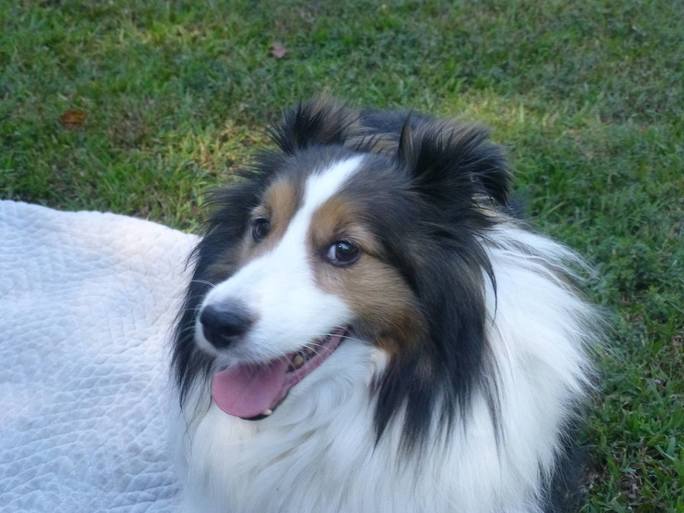Jackson – Therapy for Dog and Human
My wife and I attended Northern Chesapeake Sheltie Rescue’s annual picnic on September 23rd. This year we went alone as our own Shetland Sheepdog, Chipper, passed away last spring.
We have been grieving his loss ever since and this picnic was a good opportunity to get reacquainted with those we had met over the years as well as to get our Sheltie fix.
Jackson is a nine-year-old rescue Sheltie who, in the first seven years of his life, was kept confined and isolated in a barn with little to eat or drink. He was abused and even though being in a loving home for the past two years, he still bears the scars and fears of his former life. When he was first rescued he did not bark and now he is happy to join the other shelties with his new voice.
Jackson is devoted to his adoptive mother and follows her everywhere, but he is afraid of strangers. At the picnic, our families sat near one another. Jackson was skittish and wary of my overtures of friendship but, under the watchful eye of “Mom,” I was able to pet him and, eventually, lift him up onto my lap.
Once there, he was happy and felt safe. Together, we experienced about an hour of mutual therapy.
Since his adoption, Jackson has been slowly healing from his abusive past and is becoming more comfortable around other dogs. However, he remains timid and fearful of people. His healing will be a lifelong process, which has been helped by the adoption of two more sheltie rescues to mentor him in his loving home.
It was certainly a pleasure on my part to not only be able to extend love to this sweet sheltie, but to know that – as he was giving me therapy – I was also showing him that he could be loved by other people. (The world is not as dark and fearful as he thinks.)
Despite our time together, just a short time later, as we were departing, Jackson again shied away from me. His wounds run deep, as so often do the wounds in our own human hearts.
Many of the shelties at this picnic come from abused backgrounds. That is why they have been rescued and adopted into loving homes. Most are very friendly and approachable. A few, like Jackson, need more time and encouragement.
It occurred to me that people are like that, too. We all come with our own – very mixed – baggage. There is no one universal approach to healing. We must be alert to the nuances of each situation and story.
For those most wounded, like Jackson, patience, persistence, and love are required. Like some people, Jackson expects the worst from others, including those who may intend no harm and actually have pure love to share.
Jonah Goldberg notes that, almost uniquely among animals, dogs “can read human body language and expressions.” For wounded creatures (human and animal), suspicions and fears can paralyze us and dull our senses. (Our perceptions are not always reality.)
Darkness has a way of blinding us to truth, to love, and to the good that surrounds us. It can blind us to the wounds within other people. And it can blind us to the love that our heavenly Father wants to share with His children.
In our case, we have Jesus to share with others. Let us help heal the Jacksons of this world with the love of Jesus, one encounter at a time, moment by moment, until the Light fully dispels the darkness.
If you’ve experienced times when God has picked you up, placed you on His lap, and lavished His love on you, then share those experiences with others. You never know whose heart might be healed. (It might even be your own.)
[Jackson’s mom emailed me writing, “Thank you for ‘seeing’ Jackson as he is.” It made me think; do we see God’s creatures through His eyes or through the lens of our own prejudices, pain, and fear?]

